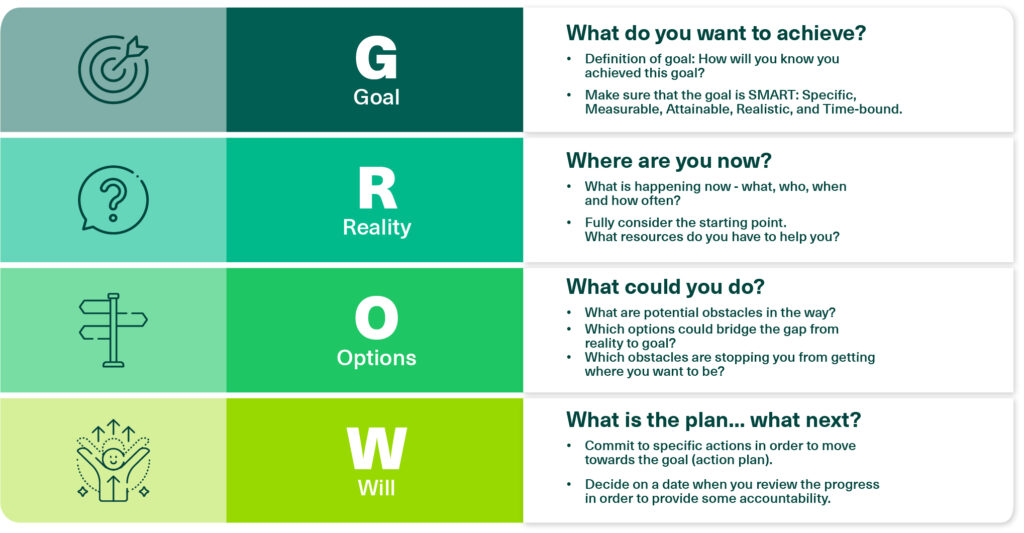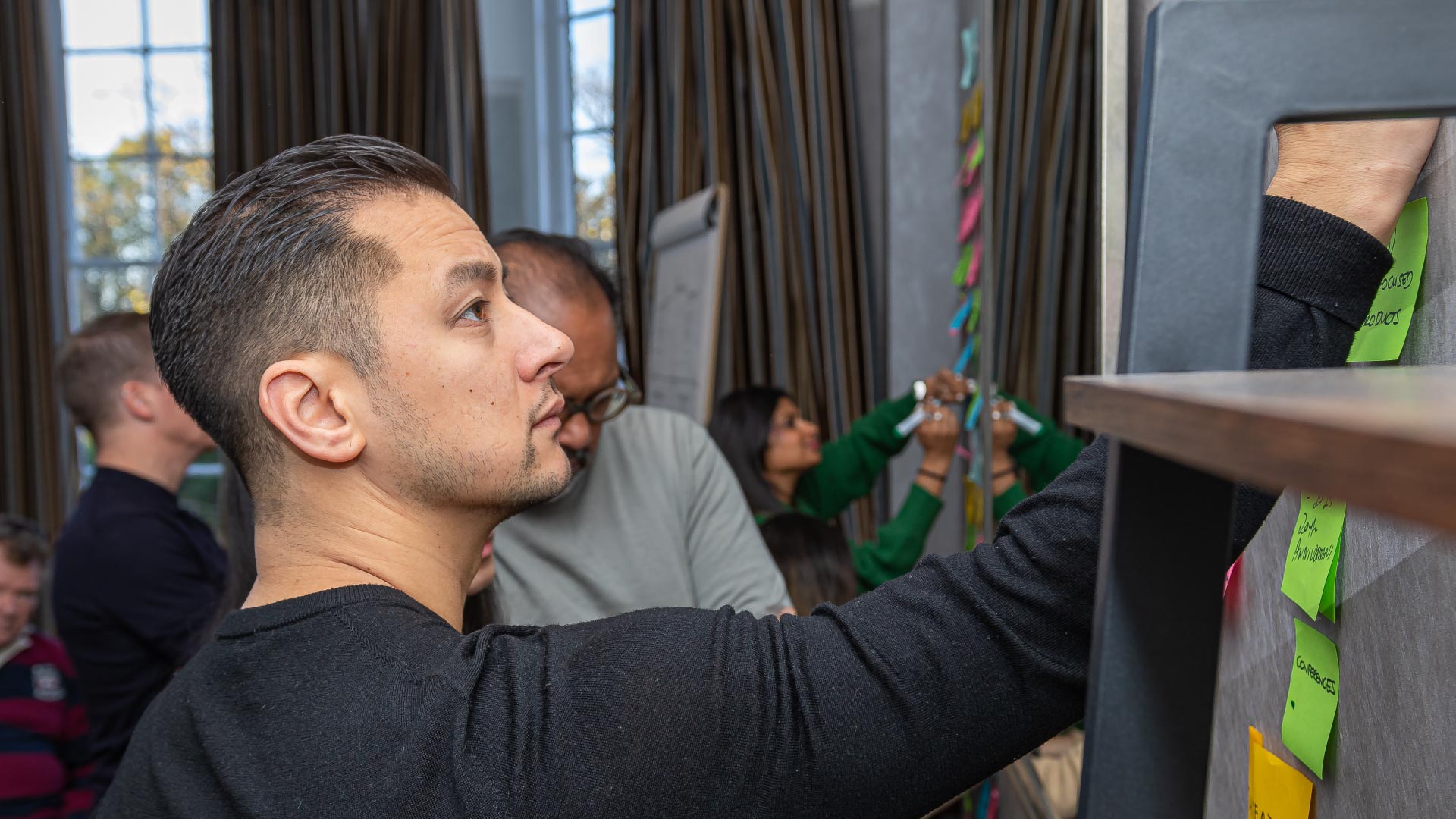At Oxford Leadership, we say “leadership is about relationships and relationships are defined by the conversations”.
As a leader, it is our responsibility to empower our teams and foster their growth. By developing your coaching abilities and applying it as part of your leadership “toolbox” can be a great key component in helping you to enable this, while building deeper relationships and growing as a leader.
Coaching conversations provides a platform for individual and organizational development. This is why in this post, I want to explore how leaders can leverage the GROW model, developed by Sir John Whitmore, that is a good framework to start with, together with some guidelines on how you could start implement this.
The GROW model is a four-step framework that facilitates meaningful coaching conversations, so let’s dive into each step:

Setting the stage for coaching excellence:
First, we start with the intention and purpose for ourselves to guide us in how we set up the context. Aim to create a workplace where team members feel supported, valued, and empowered to reach their full potential. As leaders, we can create this environment by setting the stage for coaching conversations. By expressing genuine curiosity about our team members’ aspirations and aligning their development goals with organisational objectives, we create a purposeful context for growth and learning. Through this approach, we foster a culture of continuous improvement, collaboration, and personal development.
The GROW Coaching Model Framework

1. Goals:
Establishing clarity & focus
One essential aspect of coaching is helping individuals gain clarity about their goals. Encourage your team members to reflect on their aspirations, both short-term and long-term. By creating an open dialogue, we can collectively identify specific, measurable, attainable, relevant, and time-bound (SMART) goals that resonate with their ambitions. By defining clear objectives, we provide a sense of direction and purpose, empowering our team members to make progress toward their desired outcomes.
- Encourage your team members to articulate their goals in specific terms. For example, “What specific outcome would you like to achieve?”
- Ask questions to help them make their goals measurable. For instance, “How will you know when you have achieved this goal?”
- Challenge them to ensure their goals are attainable by asking, “What resources or support do you need to reach this goal?”
- Connect their goals to the broader organizational context by inquiring, “How does this goal align with our company’s objectives?
2. Reality:
Exploring the current situation
The reality stage involves helping individuals gain clarity about their current reality. Asking open-ended questions that prompts reflection on strengths, weaknesses, opportunities, and potential obstacles. By understanding their unique circumstances, we create a space for self-awareness, enabling them to recognize areas for growth and development. This exploration lays the foundation for a transformative coaching experience.
- Prompt self-reflection by asking, “What are your current strengths that can support your goal?”
- Encourage a realistic assessment by inquiring, “What are the key challenges or obstacles you are facing?”
- Help them identify opportunities by asking, “What external factors or resources can contribute to your progress?”
- Foster self-awareness with a question like, “How does your current reality impact your ability to achieve your goal?”
3. Options:
Generating strategies & solutions
This is also sometimes referred to as strategies and solutions which resonated better with people who tend to approach things with their “left brain”. Once the current reality is understood, it’s time to explore possible options and strategies. Encourage creativity and out-of-the-box thinking, fostering a collaborative and empowering environment. Brainstorm various approaches, challenge self-imposed limitations, and consider alternative perspectives. This stage expands possibilities and opens new pathways for growth.
- Spark creativity by asking, “What alternative approaches or strategies can you consider?”
- Encourage them to explore different perspectives with a question like, “How might others tackle a similar challenge?”
- Facilitate brainstorming by inviting them to generate a list of potential options, saying, “Let’s come up with as many ideas as possible without judgment.”
- Help them evaluate options by asking, “What are the potential pros and cons of each option?”
4. Will:
Committing to action
The final stage of the GROW model is all about empowering action and fostering accountability. As leaders, we can guide our team members to commit to specific steps and milestones that will propel them toward their goals. By providing support, resources, and guidance, we facilitate their progress and reinforce their commitment. Emphasise the importance of reflection and continuous learning throughout the journey. By committing to action, individuals take ownership of their development and contribute to the overall success of the organisation. Encourage a culture of reflection, learning, and adaptation as your team move forward on their developmental journey.
- Encourage commitment by asking, “What specific actions will you take to move towards your goal?”
- Break down the actions into manageable steps by inquiring, “What are the smaller milestones you can set along the way?”
- Facilitate accountability by asking, “How will you hold yourself accountable for taking action?”
- Support reflection and learning by saying, “Let’s schedule regular check-ins to review progress and make any necessary adjustments.”

Some additional guiding points to enhancing your coaching approach:
In addition to the GROW model, consider developing the following elements and capabilities into your coaching approach:
- Active Listening and Empathy: Create a space for deep listening and empathetic understanding to establish a strong connection with your team members.
- Powerful Questions: Use thoughtful questions to stimulate reflection, broaden perspectives, and encourage critical thinking.
- Feedback and Support: Provide constructive feedback and ongoing support to nurture growth and build confidence.
- Continuous Learning: Encourage a culture of continuous learning, both for yourself and your team members, as you embark on the coaching journey together.
- Accountability and Follow-up: Establish mechanisms to track progress, hold individuals accountable, and provide ongoing support.
Incorporating coaching as part of your leadership practice, you will guide your team members more effectively, create alignment with the team and organisational purpose, and support their growth and self-development journey.
Developing purpose-driven organisations for good, one individual at a time!
Disclaimer*
The information provided in this article is intended to serve as an inspirational resource to help leaders initiate their understanding and application of the GROW model. While these practical educational tips can be valuable starting points, it is recommended that leaders further educate themselves within this area. They may choose to seek additional resources from their preferred providers or consider exploring the offerings provided by Oxford Leadership.
Continuous learning and professional development are essential to deepen one’s coaching capabilities and maximise the impact of coaching in their leadership practices.
Stay up-to-date with our latest news:
Subscribe
